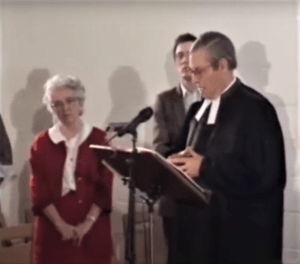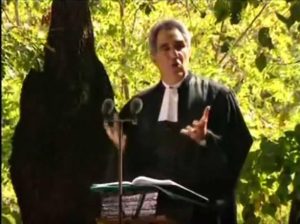Personal story
C. was born in a Protestant family, though his mother was originally a Russian Orthodox. He became active in Protestantism early on.
He was a former student at the Ecole Polytechnique and, after getting a doctorate in the United States, became an executive with various companies. When he turned 50, and already the father of four children, he decided to study theology to answer his « real call ».
He studied at the I.P.T. – Institut Protestant de Théologie- and then was an « applicant pastor » in a Parisian parish. He specialised in spiritual guidance, as a participant in the « Fraternité spirituelle des Veilleurs ». Spiritual guidance as part of the pastoral ministry was his dissertation subject for his Master’s degree.
The parish, the specifications for the pastor
In 2004, C. was appointed as one of two pastors of a parish with two worship places. The parish numbers some 700 families from different walks of life, and about forty children. There are also various ethnic groups, notably a rather large Malagasy community.
60 volunteers run the Association d’Entraide (Mutual Aid Association) preparing meals for the food bank and give French classes to adults.
Pastor C. was given the following tasks:
- Carrying out worship once every three weeks, catechism and pastoral acts: baptisms, weddings, burials.
- Giving parishioners spiritual guidance which involved visiting or receiving people.
- Being the referent for the Mutual Aid service which should mainly witness to the Gospel.
- Leading the « Alpha » course in evangelical training, which comprises an 11-week cycle, with a dinner and discussion after each session, as well as a retreat. There are two cycles per year. Those classes are publicised by « word of mouth » and attract about 15 people per cycle. They could result in baptism or « liturgical reception ». Over a two and a half years period 6 baptisms took place.
- Chaplaincy work for the city’s detention centre and visiting inmates in their cells.
- Giving spiritual guidance to a group of Chrisitan company leaders and directors in the city at monthly meetings.
Pastor C. was a member of the East Region Council of the Reformed Church and a member of the CIRPE – Coordination Interregionale Pour l’Evangélisation- (Interregional coordination for Evangelising). He yearly presided over worship with the city’s authorities and organised a number of ecumenical meetings. But the pastor must also, as part of his mission, rest, get spiritual renewal, and may also go on a retreat.
The hardships in a pastor's life
C. found is difficult to divide his time between professional and family life, especially to spend time with his children.
He sometimes could hardly bear the burden of spiritual guidance for some people, which can be particularly difficult: « c’est souvent dans les familles que les blessures sont les plus profondes. Il importe dans ce cas de savoir s’en décharger dans la prière ». (« It is often within families that wounds are the deepest. It is then necessary to find relief in prayer. »)
Learning not to let administrative work overwhelm you: for there is a part-time secretary in the parish.
Joys
C. got on extremely well with the other pastor and complemented him.
He also was in full agreement with the presbyteral council and the president of the regional council.
Seeing people in pain getting « better », getting over their anxieties and depression, thanks to the community’s reception in a free and non-judgmental place.
Sharing the joy of those who discover faith and ask for further training or commitment.
Perspectives and wishes
C. hopes to remain in his pastoral position after the normal 5-year period of the first appointment so as to launch projects that ran beyond that time. He especially wants to develop Evangelization in the region.
He does not wish to anticipate his pastoral « career »…



